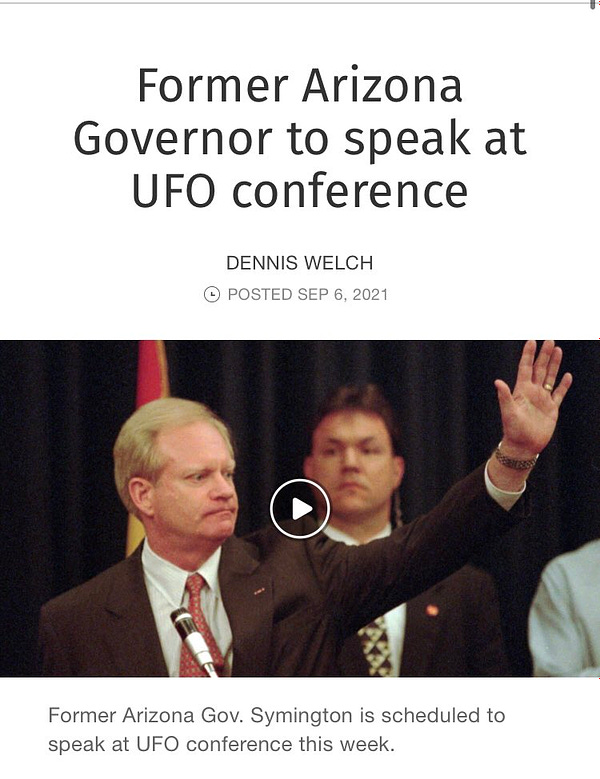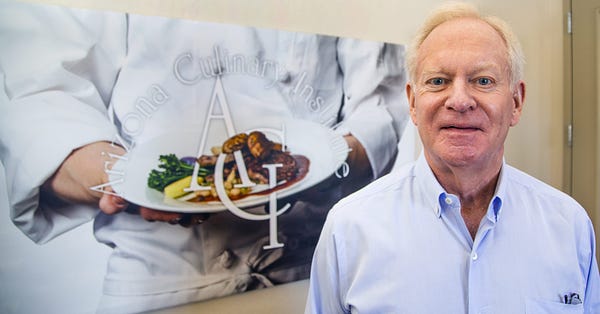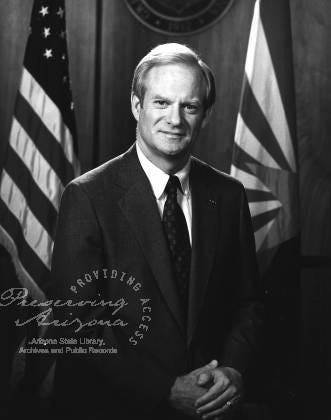
Fife Symington talks about the new biography about him
We read a new book chronicling the former governor and found lots of parallels to today. This one has everything: court cases, pardons, tons of journalists, cakes and aliens.
If you’ve heard of Republican former Arizona Gov. Fife Symington, you probably associate him with one of three things: his resignation after convictions (later overturned) for fraudulent financial dealings; his pardon from former President Bill Clinton (who he happened to save from a drowning incident when they were young men); or his stunt press conference where his aide dressed up as an alien after the infamous Phoenix Lights sighting.
But the Symington era left a lasting imprint on Arizona government and is key to understanding our present landscape. And with the transitory nature of Arizona politics, past is often forgotten.
Some of his signature policies — charter schools, tax cuts, anti-federalism, anti-regulation, tough on crime, consolidating executive power, business friendliness with Mexico — sound exactly like Gov. Doug Ducey’s platform. Some of Symington’s talking points, like “promises made, promises kept” and digs at California, later appeared in Ducey’s speeches, too.
A biography released this month — “Old Money, New West: Fife Symington and the Uniquely American Landscapes That Made Him, Broke Him, and Made Him Anew” — from former Arizona journalist Robert Nelson, co-written by the late Jack August Jr., delves into Symington’s background, his time as governor, his policy acumen and the court debacles that followed him as the real estate developer behind big projects like the Camelback Esplanade and Mercado in downtown Phoenix.
“There's too many chapters on state government,” Nelson joked. “But there are aliens, and there’s some pot at the end of it.1”
Symington was charged in 1996 with 21 counts of federal crimes related to his real estate dealings with the Esplanade and the Mercado. Prosecutors claimed he misrepresented his finances to banks that loaned him money. He was convicted of seven counts of bank fraud, which were overturned by Ninth Circuit Court of Appeals because of a juror who was dismissed who claimed she wouldn’t have convicted Symington. But by then, he had already resigned as governor since a felony conviction bars Arizonans from holding public office.
The lengthy and heavily footnoted tale also serves as a love letter to the heydays of journalism, when multiple news outlets with robust staffs competed for scoops on state government and politics. Several of the reporters mentioned in the Symington biography — Howard Fischer, Mary Jo Pitzl, Catherine Reagor — still write today. But many of the outlets covering Symington have closed up shop or are ghosts of their former selves these days.
“You take the vibrancy, the intelligence, the energy of it, there's about as many voices going at Symington, going at that topic and going at state government … as there is in DC almost,” Nelson said in an interview. “It's heartbreaking to see how little of that dialogue is left and how little of that digging is possible nowadays.”
The story behind the book deserves mention, too: August found a trove of Symington’s gubernatorial and family documents and began to write a book detailing the former governor. But August, a longtime chronicler of the West and its characters, died in 2017 with the book unfinished. Nelson, a friend and collaborator of August’s, picked up where August left off.
The book features a foreword from Bill Clinton, who claims the whole drowning thing wasn’t what convinced him to pardon Symington. Instead, Clinton wrote, he felt Symington had paid dearly by resigning the governor’s office and would better be able to pay any fees or claims if he was not in prison. Plus, Clinton noted, the government’s case against Symington was long and complicated, and probably not worth reliving.
We spoke with Symington about the new biography, his reflections on his time in office and what he’s up to now. According to the book’s epilogue, Symington contracted COVID-19 and recovered, finalized a divorce from his longtime wife, Ann, and has a new partner.
The conversation has been edited for length and clarity.
If you don’t want to read long Arizona government books but still want to know the gist of what’s in those books, we’ve got you covered. Or if you want recommendations on books that will help you understand our state better, you’ve come to the right place. You can pay to support our work for $8 per month or $80 per year. And you can share this post with your friends by clicking below. They’ll think you’re smart for reading about books!
So, you were interviewed extensively for the book. Why did you decide to participate?
Well, initially Jack August was the first author, and Jack died. And Jack for probably two years was trying to get me to help him write the book and cooperate and everything like that. And I really wouldn't have anything to do with it. Because he was of a different political persuasion, and I wasn't sure that we weren't embarking on another kind of press hatchet job. And so I resisted mightily for a couple of years. And then finally, Kurt Davis, who worked in my administration, said, ‘Governor, Jack’s a really good guy, and you should cooperate with him.’
So I relented and then Jack and I got together and it turned out that we just were really chummy and had a wonderful relationship and just shows you, you got to be optimistic and open to new things. So Jack and I embarked on this journey, and then about a quarter of the way through, he died. I had no idea that he was suffering from significant health issues. So then Bob Nelson picked up the mantle and ran with it. And Bob basically completed the mission, and I think he’s done a very fair, objective job. It's an unbiased, objective look.
What did you think of seeing that sort of compendium of your life laid out that way?
Scared the heck out of me. I'm a very private person. But I was reminded that I'm not a private person, and that there's a lot of history there, being governor and whatnot. So, I sort of wavered in terms of being excited about it, or thinking about moving to Iowa and finding a farm with a big root cellar and hiding.
You mentioned the press a couple times, and that's something that comes up a lot in the book. At that time, the press was obviously much more robust than it is now, many more newspapers and journalists. How did you see your relationship with the media?
The media during my administration was in full attack mode, 24/7. I mean, there was sort of no mercy. But in a perverse way, I enjoyed that because I like having a good debate, and I never take things personally. I think we gave as good as we got, and I think that in retrospect, it was a pretty, pretty tough media environment, but we survived it, did our job and all's well that ends well.
What do you think happened with the Phoenix Lights? I know that’s in the book as well, but what ultimately was the conclusion there2?
Well, there was no conclusion, except people are left scratching their heads trying to figure out what actually happened. Most of the explanations that were terrestrial in nature were proven to be false, so that led to the conclusion that it was extraterrestrial, or it was something out of a skunk works that none of us had ever anticipated or seen before.
Does the press conference with the alien costume come up more than you would have expected?
I've commented to Jay Heiler, my former chief of staff, ‘You know, the only thing you and I are going to be remembered for is that alien caper that we pulled off.’ I said, ‘Jay, you made a very handsome alien.’ And we both thoroughly enjoyed that caper. It was great fun. Probably the only thing we'll ever be remembered for long term.
Describing financial statements is a little bit more complex than an alien costume for a lot of people to wrap their heads around. … So, what are you up to these days? There's the Culinary Institute and then I think you've been involved with the marijuana industry. Am I correct about that?
Well, that's my son's company, it’s called Copperstate Farms. And I'm really not that involved in it.
What have you been up to since you left the governorship?
I try to help candidates that I think are worthy of running for public office. And I pay attention to the cooking school, the Arizona Culinary Institute, that we started 20 years ago. And we're now probably one of the top five professional cooking schools in the country. We teach the classic French method, and I thoroughly enjoy that and do a lot of cooking. And then I just keep track of my diverse family and dip in and out of sort of periodic issues. So I'm sort of quasi-retired, although I don't feel retired.
You mentioned you get involved sometimes with candidates now. How do you view the current political landscape, as somebody who does like a debate?
It's too bad that it's become so polarized. When I was in office, I really reached across the aisle a lot and established some friendships on both sides of the aisle and worked really hard, because a lot of the process is influenced by relationships and relationships are really vital to succeeding in the arena of public policy. So today, I think the really bright light on the horizon is Karrin Robson, who is running for governor. She worked for me early in my first term as governor and went on to build a wonderful business career and has her law degree. I'm backing her all the way.



I mentioned that I thought some of your policies mirrored what I'd covered in the Ducey administration, and I'm wondering if that's something that you noticed, too. For instance, you had the “promises made, promises kept3” slogan that he used at one point, and keeping the Grand Canyon open is something that he's worked on, too, during federal shutdowns and obviously, school choice. Do you see parallels as well?
Yeah, I see a lot of parallels. I think Gov. Ducey’s done a great job. He came from private enterprise. We both did. And so I think we had similar instincts. And I think he's carried through with his commitment to limited government and low taxation. I think he's to be commended because he's taken a lot of flack and has unusual issues to deal with, like the pandemic. And I think he's done very well with that.


Some of the backstory of Phoenix is really interesting in the book, how the city grew and how that affected politics and policy and things like that.
Yeah, the Esplanade, it was World War Three.
I mean, it's still there.
Oh, yeah, well, still a fabulous project. I went to Grant Woods’ celebration of life down at the Orpheum Theatre. And I was commenting to my seatmate that the last time I was in that place was the Esplanade zoning hearing and I had a bodyguard. It was an overflowing crowd. They were turning people away. We'd stirred up such a controversy with that zoning battle. It was amazing. It was just amazing. And of course, we lost round one. But we came back and still managed to bust through the four-story limit, which was the important thing.
It seemed like when you and Grant Woods were in office, you two had butted heads a bit. Did that relationship change over time?
Well, he and I had different views on some of the issues. I never took it personally. But we both sort of stood up for what we believed in, and I respected him for that. So, we were never very close, but I respected him, and his contribution to the health and welfare of Arizona was pretty significant. I actually liked Grant. I found him to be a very amusing character, actually.
These big developments that you worked on are still around, like the Mercado is still there. Obviously the Esplanade is still there. Do you think if the environment were like now, with a really robust real estate environment, that any of the investigations would have happened?
Had the economy not collapsed, there wouldn't be anything for the government to go after. Basically they were criminalizing the loss of money, in my case, losing money as a criminal act. That was a new one for me to understand. But I wouldn't have lost the buildings in a good economy. It was just one of those things where the timing turned out to be terrible.
Do you think if you were a private citizen that you would have been indicted at all?
No, if I’d been a private citizen, none of this would have happened.
That said, did you regret being governor then at any point?
I really have no regrets. It was unfortunate to have to go through the dragnet, but being governor is the best job you could possibly have, and I got to pretty much complete the Symington Plan, do everything I promised the public I would do. And it also was a real eye-opener, to behold the power of the federal prosecutorial arena, the power that these people have, it's just scary. To be at the wrong end of that was quite an experience.


Most people who go through the criminal justice system don't have teenage friendships with the president. So, I'm wondering, as your life has progressed, how do you look back on it? Are you aware of how unique that kind of circumstance is?
Well, first of all, let me just say, I don't think I needed the pardon because we won the case, and it got thrown out in the Ninth Circuit and there was all kinds of prosecutorial misconduct. … But anyway, I didn't really need the pardon, even though the government was making noises about trying to come back. But their heart wasn't in it. And the pardon was basically a good insurance policy because the dragnet had gone on for far too long. … I just remember reading the New York Times on a Sunday and seeing where Clinton was taking a lot of hits for a lot of drug pardons. And I turned to my wife at the time, in the evening and said, You know what, I never thought about this before, but maybe he needs a good Republican in the mix to balance this out, and let's just run it up the flagpole. So he and I happen to have a mutual best friend, and that's how it happened. So that's just the way it is. We had a sort of interesting relationship over the years, Clinton and I.
What I'm saying is, do you recognize just how unique it is that you knew Clinton from this swimming incident as kids and having a mutual best friend over the years. Does that feel unique to you?
Well, I'm sure every pardon is sort of unique and its derivation is unique. I believe that my — he’s either double-great or triple-great grandfather — the original Stuart Symington, they called him “the major,” who was part of General Pickett’s staff during the Civil War and went up Cemetery Ridge and survived it. He refused to take a loyalty oath to the Union. He was at Appomattox. And he went to Germany to study law. And then, I believe, if my history is correct, he came back and President Grant pardoned him. So that was the first presidential pardon in our family. So I know of two in our family. I don't know whether you say that means both are unique or whatever.
Participating and having this biography come out about you is maybe something that makes you think about what your legacy is. Have you thought about what it is?
You know, I really don't. I'm sort of always in forward motion. I don't really look back that much. I'm looking at new opportunities, always excited that every day is a new day and you never know what opportunity’s gonna cross your path. And I'll leave my legacy to the historians. I think Bob Nelson has done a great job, and the time and space that he had to sort of do a pretty good picture of my life. History will decide, right? Always does.
The Symington family now owns one of the largest legal marijuana farms in North America.
If you're too young or weren't here at the time, the Phoenix Lights were spotted in the sky in Arizona and Nevada in 1997 and have since become a part of Valley lore about UFOs. While many still lean into the mystery, some journalists have provided extensive explanations over the years.
This was also a Trump slogan during his re-election. It's hardly unique, it's just interesting when and how it's used.






